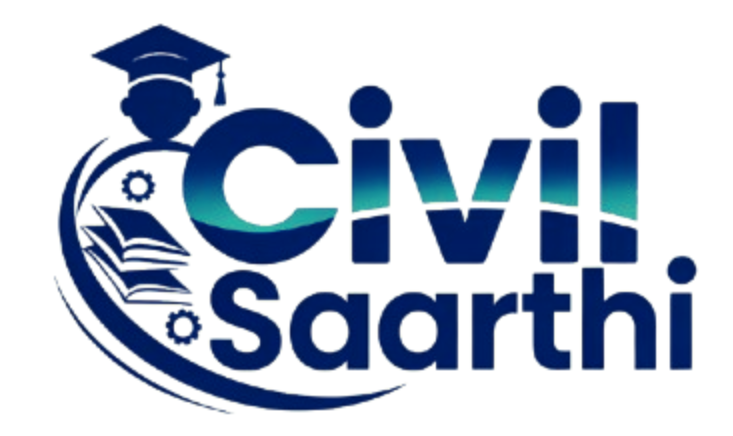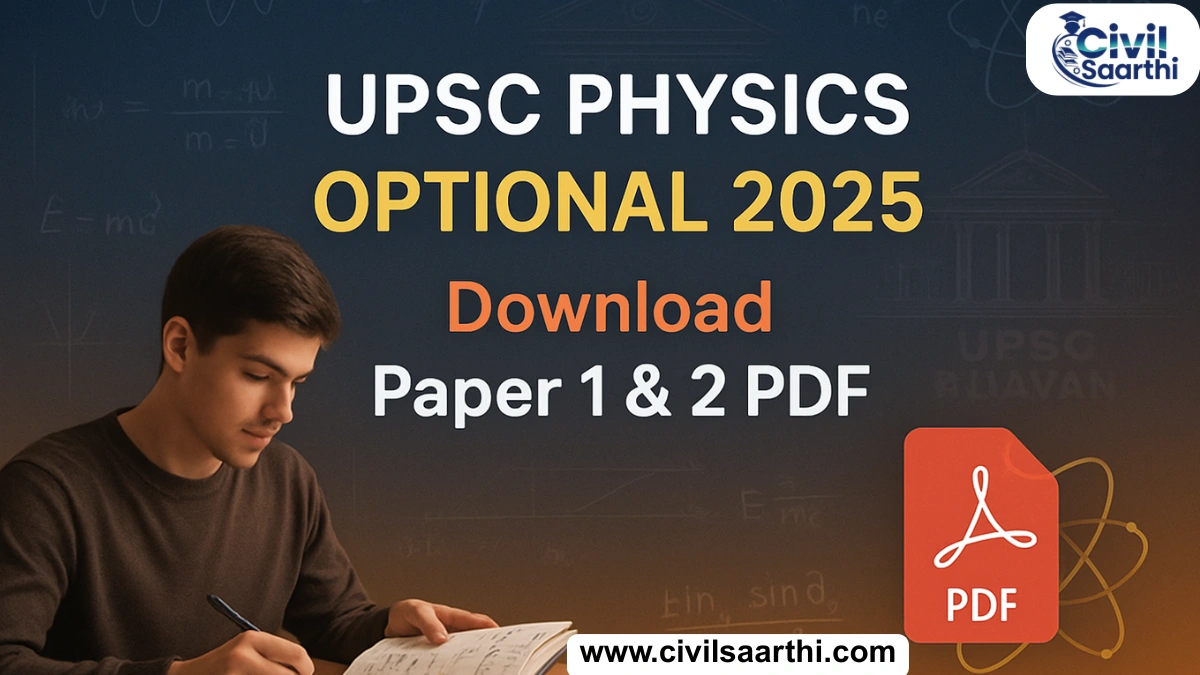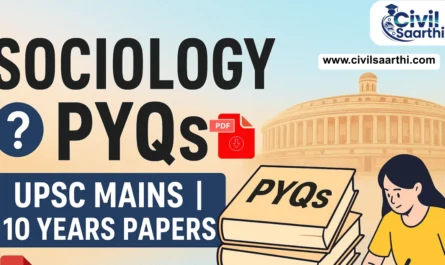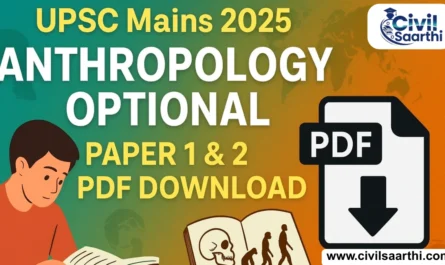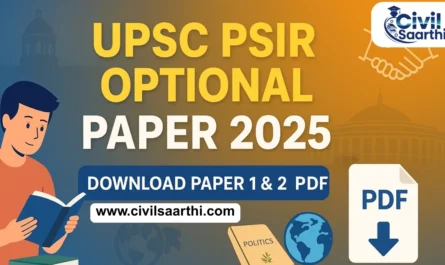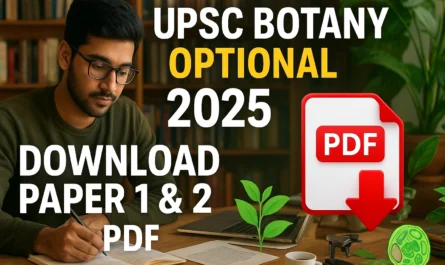The UPSC Physics Optional Paper 2025 is one of the most preferred optional subjects among aspirants with an engineering or science background. Physics requires conceptual clarity, mathematical ability, and strong problem-solving skills. With the right preparation, it can be a highly scoring optional that provides an advantage in UPSC Mains.
UPSC Physics Optional Paper 2025 Overview
The UPSC Physics Optional Paper 2025 overview helps aspirants understand the key details of the subject. This optional consists of two descriptive papers, each carrying 250 marks, making it a total of 500 marks in Mains. Candidates with a sound understanding of Physics concepts often find this subject manageable compared to humanities optionals.
| Particulars | Details |
|---|---|
| Subject | UPSC Physics Optional |
| Exam Conducting Body | Union Public Service Commission (UPSC) |
| Mode of Exam | Offline (Pen and Paper) |
| Papers | Paper 1 and Paper 2 |
| Total Marks | 500 (250 each) |
| Type of Questions | Descriptive |
| Eligibility | Candidates appearing in UPSC Civil Services Mains |
UPSC Physics Optional Paper 2025 Download PDF
Candidates can download the UPSC Physics Optional Paper 2025 PDF for Paper 1 and Paper 2 from the official UPSC website. Having the PDF copy helps in practicing questions, analyzing exam trends, and planning a preparation strategy effectively. It also serves as a valuable resource for time-bound answer writing practice.
UPSC Physics Optional Paper 1 2025 Download PDF
UPSC Physics Optional Paper 2 2025 Download PDF
Steps to Download UPSC Physics Optional Paper 2025
The process to download the UPSC Physics Optional Paper 2025 PDF is simple. Aspirants should regularly visit the UPSC portal to stay updated with official notifications. The step-by-step process ensures they don’t miss out on authentic and updated exam resources.
Visit the official UPSC website at upsc.gov.in.
Go to the Examination section.
Click on Previous Year Question Papers.
Select Physics Optional 2025 Paper 1 & Paper 2 PDF.
Download and save for offline preparation.
UPSC Physics Optional Paper Exam Pattern 2025
The UPSC Physics Optional Exam Pattern 2025 provides clarity on the structure and marks distribution. Paper 1 generally covers classical topics such as mechanics, thermodynamics, and optics, while Paper 2 focuses on advanced topics like quantum mechanics and electronics. Understanding this pattern helps aspirants allocate preparation time wisely.
| Paper | Topics Covered | Marks | Duration |
|---|---|---|---|
| Paper 1 | Mechanics, Waves, Optics, Thermal Physics, Electricity & Magnetism | 250 | 3 Hours |
| Paper 2 | Quantum Mechanics, Nuclear Physics, Solid State Physics, Electronics, Atomic Physics | 250 | 3 Hours |
| Total | Both Papers Combined | 500 | 6 Hours |
UPSC Physics Optional Booklist 2025
A strong booklist is vital for cracking the UPSC Physics Optional Paper 2025. Standard reference books provide conceptual clarity, while solved examples and problem sets improve application skills. Below is a recommended booklist tailored for UPSC aspirants.
| Subject Area | Recommended Books | Author/Publisher |
|---|---|---|
| Mechanics & Waves | Classical Mechanics | Goldstein |
| Optics | Optics | Ajoy Ghatak |
| Thermal Physics | Heat and Thermodynamics | Zemansky |
| Electricity & Magnetism | Introduction to Electrodynamics | David J. Griffiths |
| Quantum Mechanics | Principles of Quantum Mechanics | P.A.M. Dirac |
| Nuclear Physics | Nuclear Physics | D.C. Tayal |
| Solid State Physics | Solid State Physics | S.O. Pillai |
| Electronics | Electronic Devices & Circuits | Boylestad & Nashelsky |
UPSC Physics Optional Success Rate 2025
The UPSC Physics Optional Success Rate 2025 shows that candidates with strong academic backgrounds in science and engineering tend to perform better. Over the years, the success rate for Physics optional has been fairly stable, staying between 10–12%. This indicates that while it is challenging, Physics can be rewarding for dedicated aspirants.
| Year | No. of Candidates Appeared | Recommended Candidates | Success Rate |
|---|---|---|---|
| 2020 | 150 | 17 | 11.3% |
| 2021 | 162 | 19 | 11.7% |
| 2022 | 140 | 15 | 10.7% |
| 2023 | 155 | 18 | 11.6% |
| 2024 | 160 | 20 | 12.5% |
Preparation Tips for UPSC Physics Optional Paper 2025
To prepare effectively for the UPSC Physics Optional Paper 2025, aspirants should balance theory with problem-solving. Since the subject is technical, a clear understanding of derivations and equations is essential. The following tips can help:
Build strong conceptual clarity in mechanics, electromagnetism, and modern physics.
Solve previous year UPSC Physics Optional Papers for trend analysis.
Make formula sheets for quick revision before the exam.
Practice numerical problems daily to improve speed and accuracy.
Revise diagrams and derivations multiple times to avoid mistakes.
Stay updated with recent advancements in physics for value addition.
Importance of Solving UPSC Physics Optional Paper 2025
Solving the UPSC Physics Optional Paper 2025 is extremely important for success. It helps candidates understand question framing, recurring topics, and the expected level of detail in answers. Regular practice also enhances time management and boosts confidence in attempting both theory and numerical questions effectively.
UPSC Physics Optional Paper 2025 FAQ
Q1. How many papers are there in UPSC Physics Optional 2025?
There are two papers – Paper 1 and Paper 2, each carrying 250 marks, making a total of 500 marks.
Q2. Is Physics a scoring optional for UPSC 2025?
Yes, Physics is considered a scoring optional, especially for engineering graduates and science postgraduates who already have a strong base.
Q3. Can I download UPSC Physics Optional Paper 2025 PDF?
Yes, aspirants can download the official PDF of both Paper 1 and Paper 2 from the UPSC website under the question papers section.
Q4. What is the success rate of UPSC Physics Optional?
The success rate for Physics optional usually ranges between 10–12%, making it a competitive but stable subject.
Q5. Which books are best for UPSC Physics Optional 2025?
Books by Goldstein, Griffiths, Ajoy Ghatak, P.A.M. Dirac, and Boylestad are considered the best for comprehensive preparation.
